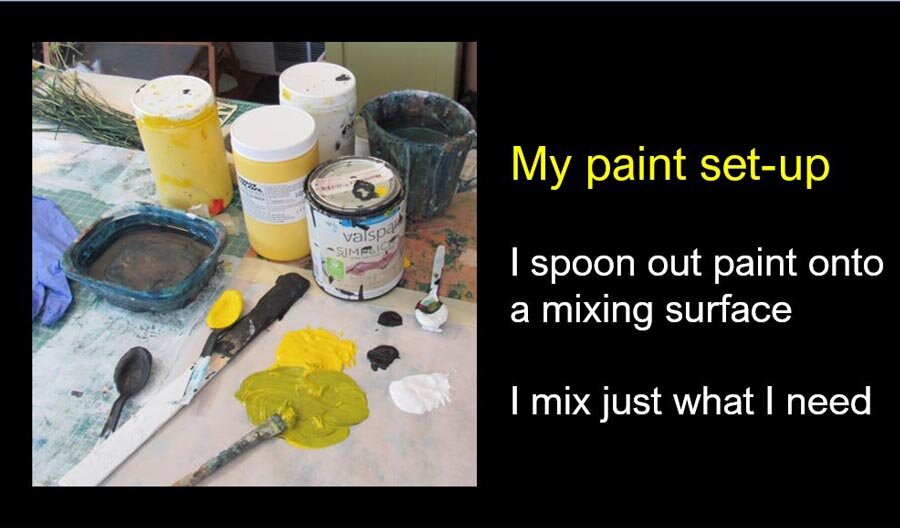This week I presented (via Zoom) a program to the Florida group of Studio Art Quilt Associates on the subject of acrylics – mixing up the variables.
(Just a note about zoom. Who knew I would ever look so forward to these online meetings! With “real” contacts down to almost nothing – except for an occasional outing to the grocery store – I’ve discovered that friendship and camaraderie are alive and well on the internet. I’m grateful.)
Because I use acrylic paints for all my fabric surface design, I’ve accumulated a lot of images of the fabrics. And I hope I’ve discovered a few insights and working methods worth sharing. As always happens when I teach or make a presentation, I learn again some important things when I go through my notes to put things together.
So, here are a few basics.
First; I create all my own fabrics.
I only purchase blank fabric by the yard. This is not all that unusual; many textile artists enjoy the process of doing original surface design. And they may choose completely different methods: dyeing and digital printing, for example. It’s an important part of the process to me. I generally create yardage specifically for a particular work. This happens early in the thinking about the meaning of a new work. I print just about what I think I’ll need. It becomes a way of thinking through palette and values. And – delightfully – there are almost always some leftover scraps. So, those will appear in other works. It’s a way for all my work to have some things in common and to be recognizable as mine.
Second: Low tech and simplified. I am intentionally limited and simple in my methods. I use a limited palette.
Some of the tools for getting acrylics on fabric: brushes. Sponge. Roller. Brayer.
I use hand-cut stencils and simple mark-making tools. I’ve just introduced a few silkscreeed images into my works. I limit my materials to just acrylic paints and mediums plus fabric, and challenge myself to create a variety of interesting textures and patterns with those tools.
Third: Color.
Learning to mix colors was probably the most important skill I ever developed in artmaking. I took an oil painting class from a very good teacher who stresses the fundamentals. I did not like oils at all. But I ended up creating a very thorough color wheel in acrylics. I refer to it all the time. I use it as a guide when I need to experiment with colors interacting with one another.
Fourth – playfulness and the unexpected. It’s in the creation of fabric that the most serendipitous things happen in my studio. Unexpected results add interest to the works I eventually create.
Right now I have two large quilts-in-progress in the studio. I’ve printed some of the fabric for each. I’m looking forward to seeing how they come together.
Thank you for reading. I always enjoy questions and comments.
--Bobbi
How I keep in touch:
BLOG POSTS - once a week: If you would enjoy receiving blog posts by e-mail, please subscribe here: I post and send by e-mail each Sunday evening. BLOGS-BY-EMAIL
NEWSLETTER – about once a month: If you enjoy more detailed behind-the-scenes stories, as well as FIRST LOOKS at new works and members-only discounts, I hope you’ll become a Studio Insider. You’ll hear from me about once a month. NEWSLETTER











